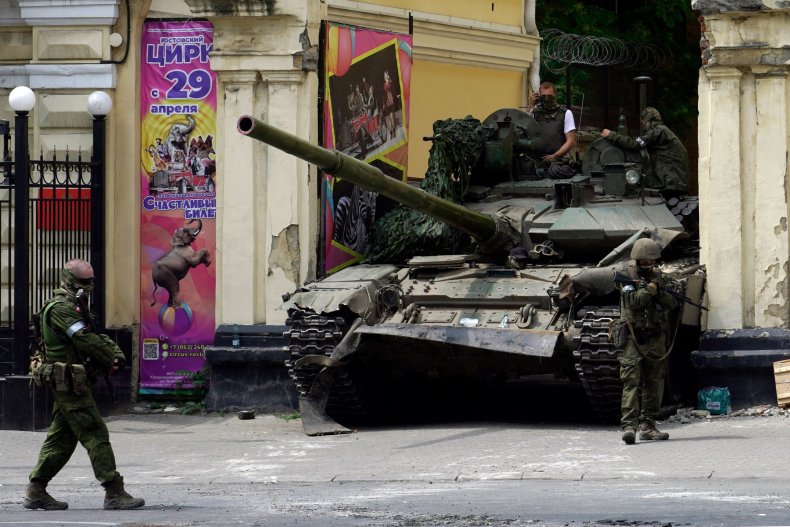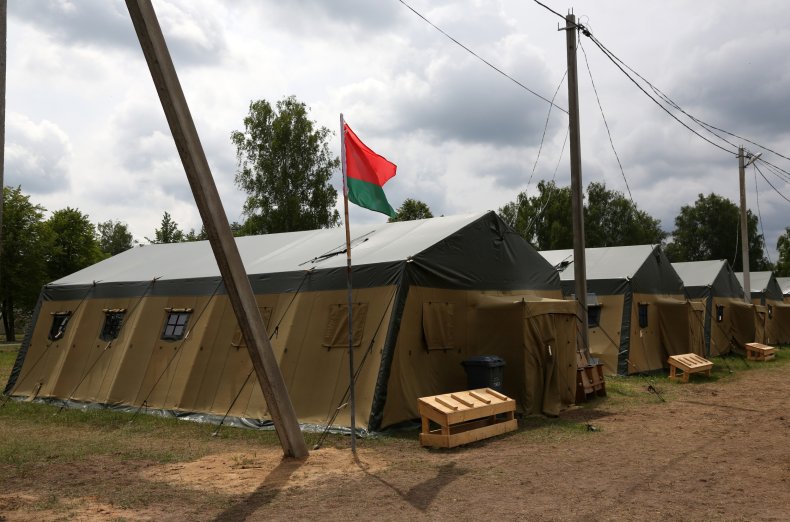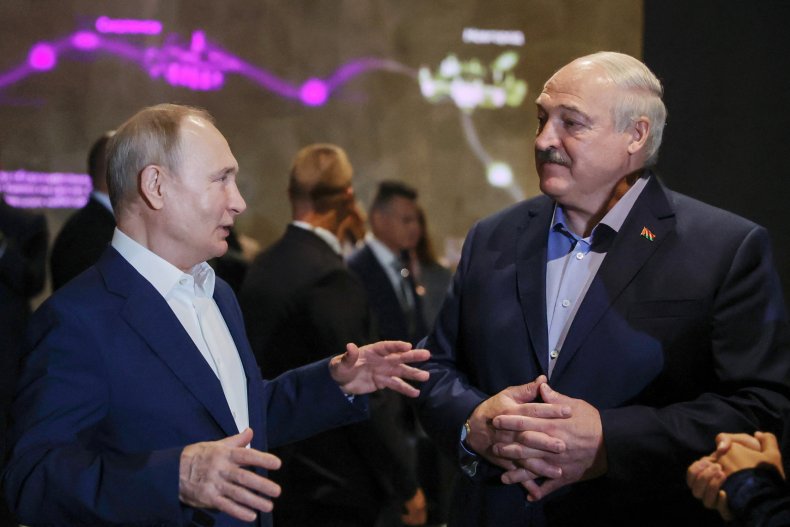Belarus' democratic opposition has told Newsweek there are now between 3,000 and 4,000 Wagner Group fighters based in the country with more likely to come soon, as the mercenary group relocates from Russia following their abortive June mutiny.
Franak Viačorka—the chief political adviser of exiled Belarusian opposition leader Sviatlana Tsikhanouskaya—said in an interview that the number of Wagner fighters is higher than the several hundred widely reported in Western media, and that Wagner boss Yevgeny Prigozhin still harbors significant ambitions.
"Right now, there are about 3,400-3,600 mercenaries on Belarus' territory," Viačorka said. "All of them are based in one place, it's a military base in Tsel not far from Minsk. And about 700-750 vehicles. But not heavy vehicles, not tanks, not heavier armored cars, but just ordinary transportation vehicles, at most with guns on them."
"There were about 10 groups, 10 columns of Wagner mercenaries who arrived in Belarus, with 300 to 500 people in each of these groups," Viačorka said. "These are soldiers who refused to sign contracts with the Russian army, so decided to stay with Prigozhin."

"Prigozhin already visited them. He probably stayed overnight with them, spoke in front of them. He said that this is a temporary home, a temporary base for them. He promised that they were just beginning, they will continue their work in Africa and other countries. So, Prigozhin has basically a new headquarters, a new base in Belarus."
Newsweek was unable to verify these claims independently and has contacted the Belarusian Foreign Ministry by email to request comment.
What Next for Wagner?
Satellite imagery from space technology company Maxar collected on Sunday has revealed the scale of the new base at Tsel, 50 miles southeast of the capital Minsk and around 450 miles from Moscow. The garrison is reportedly Wagner's new hub in Belarus, where President Alexander Lukashenko has offered Prigozhin and his soldiers safe haven as part of a deal to end their mutiny against the Russian Defense Ministry.
It remains unclear exactly how many Wagner fighters are in, or on their way to, Belarus. Media reports have suggested there are around 300 Wagner fighters in-country, though one Wagner commander said on July 19 that the real figure was 10,000.
Also unclear are the group's future intentions. Already, photos have emerged showing Wagner fighters instructing Belarusian forces. Lukashenko has also said that the group wants to strike the West and attack NATO's eastern flank.
Officials from eastern NATO nations, such as Poland or Lithuania, have told Newsweek they are concerned about the presence of Wagner fighters in bordering Belarus, warning that their presence might exacerbate established frontier tensions and security fears.
The U.S.-based Institute for the Study of War has said that the Wagner force in Belarus is too small and too lightly armed to pose a conventional threat to NATO or to Ukraine. But Viačorka said its presence alone could mean trouble.

"It's not enough for attacking Ukraine or going to Poland or Lithuania," he said of the thousands-strong contingent at Tsel. "But it's enough to spread fear. It's enough to organize provocations, if needed. It's enough to train and to expand the presence."
And for pro-democratic Belarusians still hoping to topple Lukashenko, Wagner's arrival poses an immediate danger. "Belarusians are taken hostage not only by Lukashenko but now by Prigozhin," Viačorka said.
"Belarusian society doesn't support the presence of Wagner mercenaries. We don't have recent polling, but we have anecdotes from people, from our contacts within the nomenklatura," he added, using a Cold War-era term referring to bureaucratic elites. "They are really upset because of these thousands of Prigozhin's thugs."
"They will definitely create a lot of tension, definitely will be creating conflict within Belarusian society," he added. "It is another tool of control of Belarusian society by Russia. Even if they're not obedient or loyal to Putin, they're still Russians. And Russians, they don't see, they don't leave any space for a democratic Belarus."
"It's not to be excluded that Prigozhin's troops could be used for suppressing resistance or any public unrest in Belarus. So, if there is a window or opportunity for new rallies, it's very likely Lukashenko will try to use Prigozhin's thugs for that. And Prigozhin will likely be happy to participate."
Moscow's Anchor
Already economically dependent on Russia, Lukashenko has been heavily indebted to Putin since the Kremlin helped the dictator retain power amid mass protests in 2020. The upheaval of the Kremlin's war on Ukraine has enabled Putin to crush dissent at home and draw Belarus even closer.
Lukashenko is one of Putin's few sure allies. Minsk has so far refrained from direct participation in the war, though Belarusian territory has been used as a key staging ground for Russian actions, a launchpad for aircraft and missiles, and a recuperation and training site for mauled Russian units. Minsk has also provided significant amounts of military material to help refit Moscow's battle-weary units.
Belarusian opposition figures have long decried their "occupation" by Kremlin forces, sharpened by Putin's claimed deployment of tactical nuclear weapons to the country this year. Wagner, Viačorka said, is another strain of Russia's growing control of the nation's security.
"Nuclear weapons in Belarus do not impose an imminent threat, but the presence of nuclear weapons anchors Russian control over Belarus," he said. "Wagner troops, they do not impose a threat to Ukraine, for example, as there are not enough heavy weapons. But their presence increases control over Belarus."

"We ask the West, we ask the world, to look at this from the Russian perspective. Our country has been subjected. Don't close your eyes. Don't make Belarus the consolation prize for Putin."
"For Putin, control over Belarus is crucial. For Putin, the war against Ukraine will not have any sense without Belarus. For Putin, losing control over Belarus will mean the failure of the whole campaign since 2022."
The "symbiotic" relationship between the two dictators is deepening, Viačorka said, citing Lukashenko's regular visits to see his Russian counterpart. "Lukashenko doesn't see his ministers, his chief of the administration, as often as he sees Putin. Perhaps he doesn't see his sons so often as he sees Putin right now."
"These visits with Putin need special investigation. Because their relationship is very, very weird. Lukashenko goes to Putin almost every two to three weeks."
The Belarus opposition wants the West to put "more pressure on Lukashenko and Putin's regimes through sanctions," Viačorka said, noting Minsk's evolving role as a sanctions-busting conduit for Moscow. "When the West does not impose sanctions, when there is no incentive for Lukashenko to stop supporting Putin. He increases, he escalates," he said.
"This is why proclaiming his as a terrorist regime, and launching an international tribunal, are so important," Viačorka added. "Because it can help to split elites around Lukashenko."








